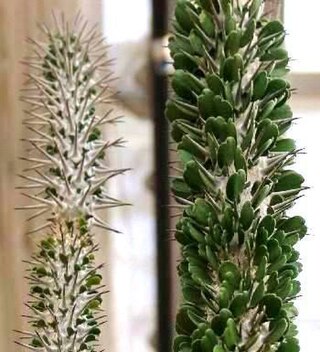Related Research Articles

Joseph Marie Henry Alfred Perrier de la Bâthie was a French botanist who specialized in the plants of Madagascar.

Conyza is a genus of flowering plants in the family Asteraceae.

Gerbera L. is a genus of plants in the Asteraceae (Compositae) family. The first scientific description of a Gerbera was made by J. D. Hooker in Curtis's Botanical Magazine in 1889 when he described Gerbera jamesonii, a South African species also known as Transvaal daisy or Barberton daisy. Gerbera is also commonly known as the African daisy.

Didiereaceae is a family of flowering plants found in continental Africa and Madagascar. It contains 20 species classified in three subfamilies and six genera. Species of the family are succulent plants, growing in sub-arid to arid habitats. Several are known as ornamental plants in specialist succulent collections. The subfamily Didiereoideae is endemic to the southwest of Madagascar, where the species are characteristic elements of the spiny thickets.

Emilia is a genus of herbaceous plants in the family sunflower family, known as tasselflower or pualele.

Distephanus is a genus of flowering plants in the family Asteraceae. It is described by American botanist Harold E. Robinson as having over 40 species and by David Mabberley as having only 34 species. These sources differ sharply in their description of the range of the genus. Robinson has it ranging throughout Africa and occurring also in India and China. Mabberley has it restricted to southeast Africa, Madagascar, and Mauritius.
Marojejya is a genus of flowering plant in the family Arecaceae. It contains the following two species, both endemic to Madagascar:

Cosmos caudatus or king's salad is an annual plant in the genus Cosmos, bearing purple, pink, or white ray florets. It is native to Latin America, and the West Indies, though naturalized in tropical parts of Asia, Africa, and Australia.

Adenocarpus is a genus of flowering plants in the family Fabaceae. It belongs to the subfamily Faboideae. The plants are broom-like shrubs with bright yellow flowers. The genus is native to the Mediterranean Basin and sub-Saharan Africa, but finds its highest diversity in Northwest Africa and the Iberian Peninsula.
Exomiocarpon is a genus of flowering plants in the family Asteraceae.
Decastylocarpus is a genus of flowering plants in the family Asteraceae.
Grangeopsis is a genus of flowering plants in the family Asteraceae.
Vernoniopsis is a genus of flowering plants in the aster tribe within the sunflower family.
Oliganthes is a genus of flowering plants in the evil tribe within the daisy family.
Rochonia is a genus of Madagascarian plants in the tribe Astereae within the family Asteraceae.
Psiadiella is a genus of Madagascarian plants in the aster tribe within the daisy family.
Catatia is a genus of flowering plants in the family Asteraceae.
Colobanthera is a genus of flowering plants in the family Asteraceae.
Madagaster is a genus of Madagascan plants in the tribe Astereae within the family Asteraceae.
Humbertiella is a genus of plants, in the Malvaceae from Madagascar. The genus was named in 1926 for Jean-Henri Humbert (1887–1967), a French botanist and conservationist.
References
- 1 2 "Plants Trees Diaphractanthus Genus Species". Archived from the original on 2014-11-29. Retrieved 2014-11-17.
- 1 2 Humbert, Jean-Henri. 1923. Mémoires de la Société Linnéenne de Normandie 25: 31, 280
- ↑ Tropicos, Diaphractanthus Humbert
- ↑ The Plant List, Diaphractanthus bomolepis Humbert